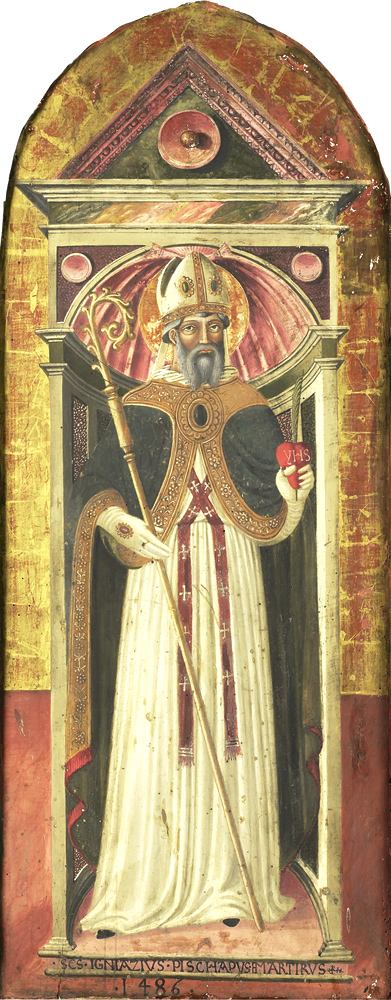And to this letter answered the glorious Virgin Mary in this manner:
Ignatius, good disciple of Jesus and his special friend, the humble handmaid of Jesu Christ sendeth to thee greeting. I do thee to wit know that all that John hath said to thee of Jesu Christ and all that thou hast learned of him is true doctrine and thing certain. Go alway in good creance, and believe and keep firmly the promise of thy Christian faith, and do thy works according to the same. I shall come with St. John for to visit thee and other Christian men with thee. Hold thee always well in the faith and in good works, and let no persecution ne nor adversity that thou shalt suffer move thee from thy faith ne from thy creance, but have solace and affiance faith in Jesu Christ thy Saviour.This was the answer of his letter.
The Martyrdom of St. Ignatius
St. Ignatius was a man right well learned, and the third bishop after St. Peter the apostle of the church of Antioch, and much desired to be a martyr for the faith of Jesu Christ. It happed that Trajan, which was emperor of Rome, passed by Antioch, to whom Ignatius showed to him and blamed of this, that he persecuted Christian men, wherefor the emperor did him to be taken and put in irons, and in that wise by ten knights to be led to Rome. There he was presented tofore the emperor and all the senators of Rome, and was constrained by promises, by menaces, and by torments, many and great an horrible, for to adore the idols. St. Ignatius showed to them clearly that their gods had been thieves, ribalds, and men of abominable and evil life, and that they were damned in hell, and that they had been in great error in this, that of so cursed men they made their gods and worshipped devils, and had forsaken God which had made and created all the world, and his blessed Son which in human nature had redeemed and saved the world.Finably, after this, that he had been tormented by fire, and by beating and prison, the emperor did send for the Romans in a place and there did do set St. Ignatius, and did do bring thither two lions for to devour him. But he had never dread for death ne for other torments, of which he had suffered many, but was always comforted for to die for the love of Jesu Christ. And he said at the last: I am wheat of Jesu Christ, which ought to be grounden between the teeth of these beasts, by which I may be pure bread for to be presented to my Lord.
And anon the lions came and strangled him without tearing of his flesh, or anything hurting it, wherefor Trajan had great marvel and departed from the place.
The Miracle of His Heart
It is read that St. Ignatius in all his torments and all the pains of martyrdom that he suffered, that his tongue never ceased to name the name of Jesus, and when they that tormented him demanded asked him wherefore he named this name so oft, he answered: Know ye for certain that I have in my heart this name written, and therefore I may not leave to name this name oft.And because hereof, when he was dead, they that heard these words opened his body and drew out his heart and cut it open, and they found within the name of Jesus written with fair letters of gold, for which miracle many received the faith of Jesu Christ.
St. Bernard’s Remarks on St. Ignatius
Of this saint saith St. Bernard upon the psalm, Qui habitat [Psalm 15]: St. Ignatius, martyr of God glorious, is of great merit, which was minister to the disciple that Jesus so much loved, and in his epistles, the which he sent to the glorious Virgin Mary, he saluted her as mother that had borne Jesu Christ and she resaluted him again, in sign that he was a person of great honour, of great dignity, and of great authority. The body of whom was honorably buried of by Christian men, to the worship of Jesu Christ which is blessed in secula seculorum. (Latin) world without end Amen.
Golden Legend Table of Contents
Christian Iconography Home Page

St. Ignatius's attribute is a heart inscribed with the name of Jesus. (See the description page for this image and the page explaining the iconography of images of this saint.)
VORAGINE'S ETYMOLOGY FOR THE NAME IGNATIUS
Ignatius is said as one suffering fire and burning, for he was embraced and all esprised of the divine and burning love of God.
This text was taken from the Internet Medieval Source Book. E-text © by Paul Halsall. Annotations, formatting, and added rubrics by Richard Stracke. Permission is granted for electronic copying, distribution in print form for educational purposes and personal use. If you do reduplicate the document, indicate the sources. No permission is granted for commercial use.